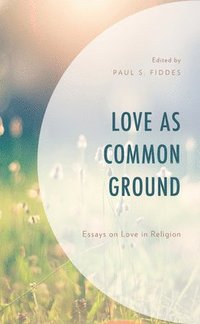Does God’s love serve as a good model for human love?
Dr Eleanor McLaughlin addresses this question in her contribution to Love as Common Ground, a newly published book of inter-faith essays on love in religion edited by Paul S Feddes.
The book explores how the study and practice of love creates a common ground for different faiths and different traditions within the same faith. For the contributors, the context of ‘common ground’ is a place of encounter with the divine where it is possible to consider together the meaning of the love and to work together to enable human flourishing.
 In her chapter, “Tensions within the Study of Love in Religion”, McLaughlin draws on Jewish and Christian scholarship to ask whether it is ever helpful to use God’s love as a model for human love. Tackling questions around divine and human agency, Trinitarian relationality, and our motivations in welcoming the divine other and the human other, McLaughlin argues that any theological investigation of love cannot remain abstract, but necessarily leads to ethical action.
In her chapter, “Tensions within the Study of Love in Religion”, McLaughlin draws on Jewish and Christian scholarship to ask whether it is ever helpful to use God’s love as a model for human love. Tackling questions around divine and human agency, Trinitarian relationality, and our motivations in welcoming the divine other and the human other, McLaughlin argues that any theological investigation of love cannot remain abstract, but necessarily leads to ethical action.
This book emergea from the Project for the Study of Love in Religion, Regent’s Park College, Oxford, which aims to create a space in which different traditions of love converge, from Islam, Judaism, and the Christianity of both East and West. Contributors use exegesis of ancient texts, theology, accounts of mystical experience, philosophy, and evolutionary science of the human to explore themes of love in religion. Insights about human and divine love that emerge include its nature as a form of knowing, its sacrificial and erotic dimensions, its inclination towards beauty, its making of community and its importance for a just political and economic life.
The Project for the Study of Love in Religion, in collaboration with The Oxford Centre for Religion and Culture, The Caritas Centre, Brescia University, USA, presents an online colloquium on Loving the Planet.
This event includes the launch of Love as Common Ground and brings together a wide range of international scholars from all over the world to discuss differing perspectives on religion, love and interfaith engagement as it pertains to loving the planet. Prof. Melissa Raphael, an external tutor at Sarum College, is a contributor to the online event. Raphael is Professor Emerita in Jewish Theology, University of Gloucestershire, teaching Modern Jewish Thought at Leo Baeck College, London.
Loving the Planet will be held online, Tuesday, 23 November 2021, 3pm – 9.30pm GMT (9am – 3.30 pm CST)
Participation is free of charge, but registration is required: Register for this free event
